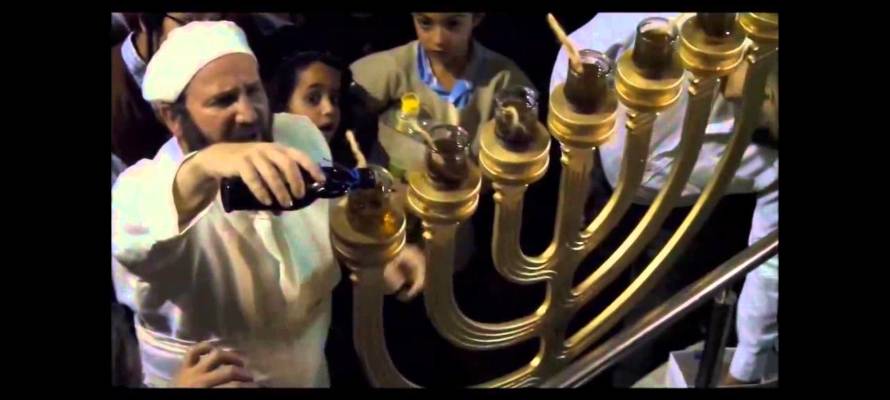Our rabbis tell us that wW. May we live to see it in our days!
By Rabbi Ari Enkin, Rabbinic Director, United with Israel
We find ourselves in the month of Av, the saddest month on the Jewish calendar. The Talmud teaches: “When the month of Av begins, one must decrease one’s level of joy”.
The climax of this sadness is the Jewish national day of mourning, Tisha B’av.
Tisha B’av means “the 9th day of the Hebrew month of Av.” A simple mention of the words “Tisha B’av” is known to instantly arouse worry and fear in people.
The month of Av is known as a month of bad luck. As such, the Talmud tells us not to engage in anything dangerous during this month, or at least not until after the 9th of Av, as “the mazal [luck] of the Jew is not healthy.”
In contrast, we are told that the month of “Adar” is the month of good luck owing to the very joyous Purim holiday that takes places during Adar.
It is during the month of Av that both the first and the second Holy Temples were destroyed among many other calamities which we will soon address. The reason for all our suffering during this month goes back to the episode of the spies.
Moses sent spies to check out the land of Israel in preparation for the imminent conquest by the Jewish people. The spies returned from their mission of scouting out the Land with fearful and slanderous reports, which sowed fear in the Jewish people, causing them to refuse to enter the land.
They even accused God of trying to kill them by taking them out of the desert, where life was wonderful, and having them face off against the mighty nations of the Land of Canaan.
As the Torah says, “The entire assembly rose up and cried…the people wept that night…” In response, God said to them, “Since you wept on this night without reason, I will give you a reason in the future to weep on this day….”
A Cursed Day
This was the ninth of Av, a day, and a month, designated for tragedy. It is interesting to note that Aaron, the brother of Moses who represented the Temple service, died in the month of Av, the same month in which the Temples were destroyed.
Other tragedies that occurred on or about the 9th of Av include: The First Crusade, which officially commenced on August 15, 1096 (Av 24) and saw the murder of 10,000 Jews and destroyed Jewish communities in France and the Rhineland; the expulsion of the Jews from England on July 18, 1290 (Av 9); the expulsion of the Jews from France on July 22, 1306 (Av 10); the expulsion of the Jews from Spain on July 31, 1492 (Av 7); the beginning of World War I on August 1–2, 1914 (Av 9–10); approval for the “Final Solution” on August 2, 1941 (Av 9); the mass deportation of Jews from the Warsaw Ghetto to Treblinka on July 23, 1942 (Av 9); the bombing, of the Jewish community center in Buenos Aires, which killed 85 and injured 300, on July 18, 1994 (10 Av), and more. It is clear that the 9th of Av is a cursed day.
Tisha B’av includes the five restrictions of Yom Kippur, the most famous of which is the requirement to refrain from food and drink for over 24 hours. The Talmud says: “Whoever eats and drinks on the Ninth of Av…it is as if he eats and drinks on Yom Kippur.”
Furthermore, we are told: “Whoever performs labor on the ninth of Av never sees a sign of a blessing from that work.”
And the Sages say: “Whoever performs labor on the Ninth of Av and does not mourn for Jerusalem will not see her future joy.” As it is stated: “Rejoice with Jerusalem and be glad with her…rejoice for her all who mourn for her.” (Isaiah 66:10)
From here we learn: “Whoever mourns for Jerusalem will merit and see her future joy, and whoever does not mourn for Jerusalem will not see her future joy.”
An Undeniable Part of Our Lives
Many of the customs that we have today stem from our mourning for the Temple, Jerusalem, and the current exile of the Jewish people. It has become an undeniable part of our lives.
As long as the Temple is not rebuilt, we are incomplete and in mourning. Therefore certain customs have evolved to limit our level of happiness in memory of Jerusalem.
Many of the customs are also rooted in the verse in Psalms 137:5, “if I forget thee, O Jerusalem, let my right hand go lame …If I do not place Jerusalem above my greatest joy.”
One of the most well-known customs is that at weddings, a glass is broken during the marriage ceremony. Breaking an item of value, along with the ‘crashing’ sound it makes, reminds us that things aren’t perfect. Things aren’t the way they should be.
Even though we are celebrating a wedding, we remember that the greatest happiness, a redeemed nation living at peace in their land, has still not been achieved.
Similarly, at an engagement party, it is the custom to break a plate for the same reason. This plate is normally broken by the two mothers.
Another custom at a wedding is to place ashes on the forehead of the groom. This is to remind the groom, on his wedding day, the day of his greatest joy, that he must still remember the Temple is in ashes.
It is also worthy to note that when we visit a shiva house to comfort mourners, we greet them by saying they should be comforted “like the mourners of Zion and Jerusalem.” This gives us a taste of the intended intensity of the mourning of Jerusalem, namely, that it is similar to the mourning for a human being.
When we set a table for a celebration or elaborate meal, we are not to use all of our beautiful dishes. We are to leave behind at least one beautiful dish from the table, perhaps an elaborate serving bowl, as an expression of limiting our joy.
On Passover, however, when we celebrate our freedom, one is permitted to use all of one’s finest utensils. So too, with the exception of a wedding meal, we are not to combine live music and wine at meals.
Finally, we are to keep a patch of wall in our home, preferable above the main entrance, bare and unfinished. This expresses that as long as God’s home is not complete, neither should ours be.
Mankind’s Complete Connection with God
The Holy Temple, which sat in the center of the Holy City of Jerusalem, represented the complete connection with God for all mankind.
It was a rectification of the sin of the spies. Unfortunately, the reverberations of the sin caused the 9th of Av to be a day of tragedy forever.
On Tisha B’av we are not merely mourning the destruction of a physical structure, but more importantly, the disappearance of God’s presence from our midst. Although God certainly still loves His people, the “proof” of this relationship is no longer on public display as it was during the existence of the Temple.
Prayers for the rebuilding of the Temple are a constant act in the daily life of observant Jews. There is not a service, hardly even a prayer in any service, that fails to include some kind of mention of the construction of the Temple and the restoration of sacrifices.
That said, it is somewhat unclear what animal sacrifices will look like when the Temple is rebuilt.
Some say that the sacrificial service will return as it once was, others suggest it will be more symbolic in nature, and yet other authorities suggest there will be no animal sacrifices at all, as animal sacrifices are no longer a common method of worship.
It is also unclear exactly how the Temple will be rebuilt. Some suggest that it will be rebuilt by the Messiah, some expect it will come down ready-made from heaven, and others say that we are not to wait for the Messianic era but, rather, we must build the Temple ourselves, now!
Mourning over the Temple is considered proper for all people to observe, including non-Jews, as non-Jews also benefited when the Temple was in existence. Our rabbis tell us that one who mourns over the destruction of the Temple will merit to see its rebuilding. May we live to see it in our days!
REBUILD ISRAELI FARMS DESTROYED BY HAMAS - PLANT TREES!
ISRAELI FARMERS DESPERATELY NEED YOUR YOUR HELP
Hamas tried to destroy everything. Terrorists murdered 1200 innocent Israelis. Join us in planting 12,000 trees of life to honor the victims. Send blessing to the People and Land of Israel.
“…I will ordain My blessing for you…” (Leviticus 25:4,21)
JOIN OUR CAMPAIGN TO PLANT 12,000 NEW FRUIT TREES ACROSS THE LAND OF ISRAEL!




